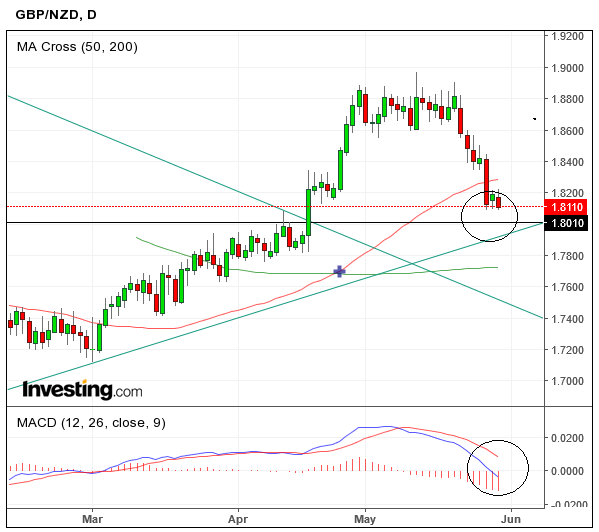The GBP/NZD Continues Falling Towards 1.8000

The New Zealand Dollar peaked and then fell to the Pound during the month of May.
From heights of 1.8900 at the start of the month, the pair has fallen to the 1.81 lows of the last few days.
We do not see an especially strong case for much more downside as strong support is situated not far below the current lows at 1.8000, and any break below the 1.8093 lows would be expected to stall at that level.

The main driving force behind GBP/NZD’s devaluation is the rise in the risk of a ‘Hard’ Brexit in the UK due to the increasingly polar opposite stances of the EU and UK in the run up to divorce negotiations.
The New Zealand Dollar (Kiwi), meanwhile, has probably captured a bid due to increasing expectations of a rate rise from the Reserve Bank of New Zealand (RBNZ).
The possibility that interest rates may be raised sooner than previously expected is positive for the Kiwi as international money tends to seek out currencies which benefit from higher interest rates.
“We bring forward the first RBNZ hike from May to Feb 2018 amid strong macro fundamentals and a regime change of RBNZ Governor towards well-known hawk Grant Spencer,” remarked St George Economics.
One major concern for the New Zealand financial authorities is the risk of the housing bubble bursting.
Goldman Sachs recently quantified the risk of the housing market going bust at 40%.
Data out on Monday showed that NZ Building Consents fell by -7.6% in April, but this is not so representative, as it is volatile data-set.
Nevertheless, the dip in consents must have lessened, if only marginally, the fear that the housing market might be overheating.
Of major interest to those monitoring the market will be the RBNZ Biennial Financial Stability Report.
This could “set the tone for the rest of the week. Importantly, given that it comes in the wake of a rather lacklustre budget which barely tackles the housing crisis in NZ, we could see the bank taking a less optimistic tone than is usual. Furthermore, the worsening situation in the Australian and Canadian housing markets is, no doubt, heightening the RBNZ’s concerns that the nation’s asset bubble could be in danger of bursting,” said Blackwell Global’s Steven Knight.
Knight also notes a positive set of economic data releases:
“Particularly of note were the NZ trade figures which included a Trade Balance outcome of 578M – a figure more than double its forecasted result,” said Knight.
Also of support was the annual budget which saw a rise in public spending, which could have a knock-on effect on inflation.
“The NZ Annual Budget threw some money around which was little surprise given the recent government surplus but it still managed to generate some positive sentiment for the NZD. The net effect of the generally solid week of fundamentals saw the pair close all the way up at 0.7061 (for NZD/USD),” said Blackwell Global’s Knight.




